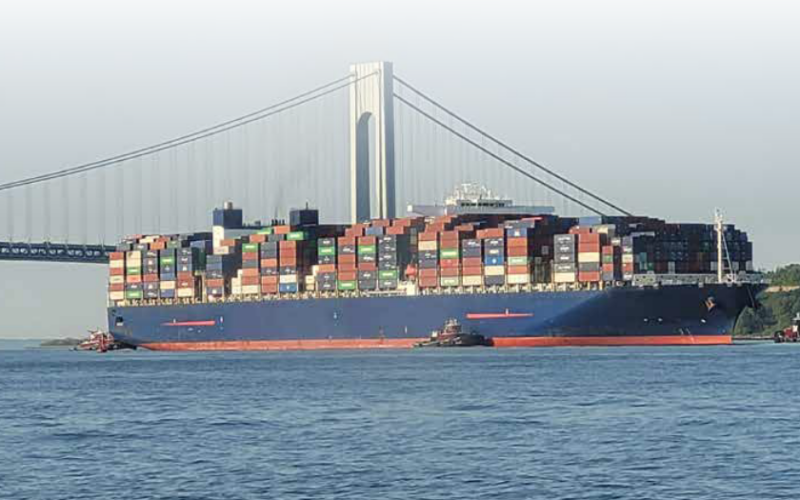(WASHINGTON) — In 2023, a total of 10,959 individual vessels, from 80 different
flag administrations, made 81,854 port calls to the United States, according to the U.S. Coast Guard. In all, 8,278 port state control (PSC) exams were conducted. These exam numbers decreased over the 2022 total of 8,706. The total number of ships detained in 2023 for environmental protection, safety and security-related deficiencies increased from 78 to 101.
Flag administration performance
Flag administration performance for 2023 dropped, with the overall annual detention rate increasing from 0.89 percent to 1.22 percent. The three-year rolling detention ratio also increased from 0.8 percent to 0.94 percent. Canada, Isle of Man and Turkey were removed from the targeted flag list this year.
“The increased detention ratio reflects a global trend that has been noted by other port state control regimes and is a possible indicator of the long-term impacts of the COVID-19 pandemic,” said Rear Adm. Wayne Arguin, assistant commandant for prevention policy at the Coast Guard. “The decrease in examinations in 2020 and early 2021, combined with travel difficulties, and delays or deferment of maintenance are but a few possible reasons for the increased detention ratio. I am pleased to note the dedicated efforts by many flag states to reverse this trend through implementation of programs to manage risk, increase oversight, and ensure compliance with international conventions.”
Detention and association appeals
In 2023, the Coast Guard received 29 appeals. Fourteen appeals challenged the overall merits of the detention. For those merit appeals, three were granted, seven were denied, and four are under review.
In addition to receiving appeals contesting the overall merits of a detention, the Coast Guard also receive appeals requesting the removal of a party’s association with a detention. For those parties appealing their association with a detention, 15 were received. Of those, five were granted and 10 were denied.

The Coast Guard welcomes any appeal based on a control action or association of
a detention, as well as any deficiency issued by the Coast Guard.
QUALSHIP 21 and E-Zero programs
The QS21 program ended calendar year 2023 with 5,066 vessels enrolled. For 2023, six flag administrations lost their eligibility while four new flags became eligible. The Coast Guard would like to welcome the flag administrations of Canada, France, Isle of Man and Spain and congratulate them for becoming QS21 eligible this year.
The E-Zero program focuses on environmental stewardship and worldwide compliance with international environmental conventions. At the close of 2023, 365 ships were awarded the E-Zero designation.
Enhanced Exam Program
Beginning in 2021, the Coast Guard initiated the Enhanced Exam Program (EEP). This program, similar to the concentrated inspection campaigns (CICs) carried out by port state control MoUs, is intended to increase focus on specific aspects of ship
safety on a quarterly basis. This increased focus may vary due to the implementation of new regulations, deficiency trends, or other PSC program interests.
The goal of the EEP is to generate meaningful data on exam points of interest, while limiting the additional workload of the PSCOs. The information collected is used for evaluating current policy effectiveness and determine if adjustments need to be made in the future.
In 2022, PSCOs carried out enhanced exams as part of routine port state control exams on pilot and embarkation ladders, immersion suits, fuel oil shutoff valves, and ballast water. The number of deficiencies issued for the campaigns based on pilot/embarkation ladders, immersion suits, and fuel shutoff valves doubled due to the EEP, when compared to the same time period of the previous year.
Based on findings from the 2022 campaigns, adjustments to the routine PSC exam scope were made. As an example, verifying the condition of pilot/embarkation ladder(s) was added to the PSC exam scope on a long-term basis.
In 2023, EEP campaign topics included cybersecurity, voyage data recorders (VDRs), fire dampers, and additional life raft arrangements. Additional life raft arrangements are meant to represent those liferaft arrangements required on cargo ships which are located greater than 100 meters from the vessel’s closest survival craft.
For the second straight year, three separate campaigns resulted in a twofold increase in the number of deficiencies issued. This trend was seen during the cybersecurity, fire damper, and additional life raft arrangement campaigns, respectively.
As new technology continues to be integrated into the foreign- flagged fleet, the Coast Guard will continue to leverage data in this manner to better evaluate evolving risk on vessels subject to PSC authority.
Click here to view the complete port state control 2023 report.
– U.S. Coast Guard

